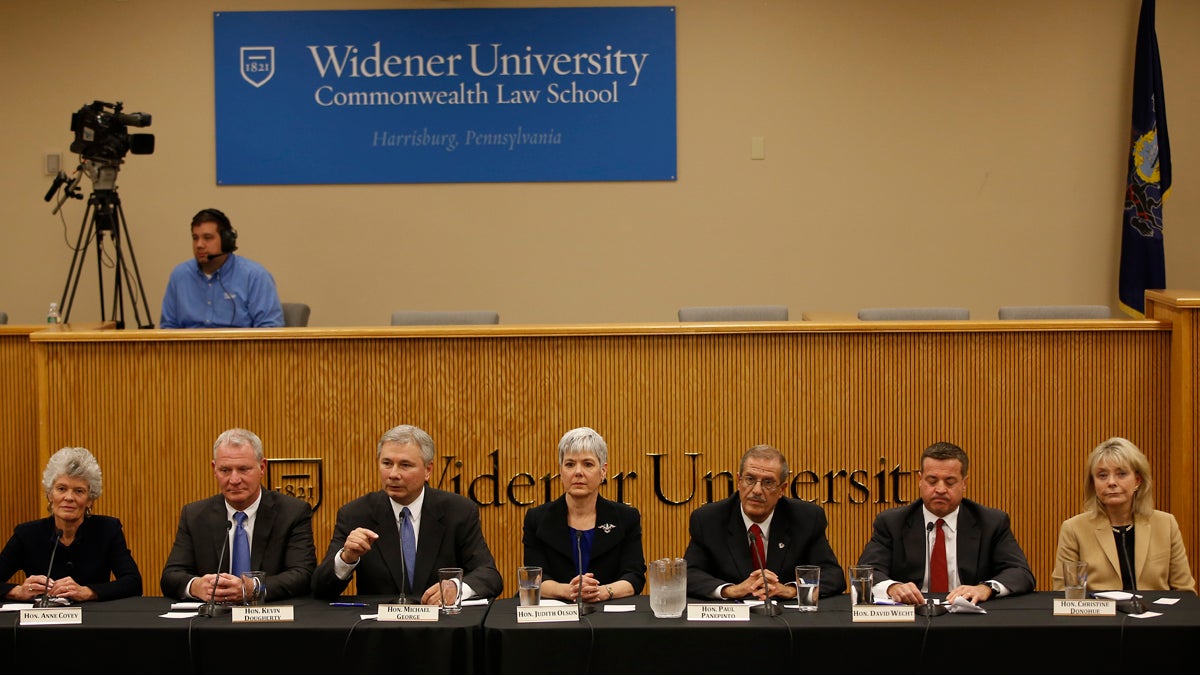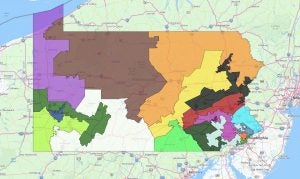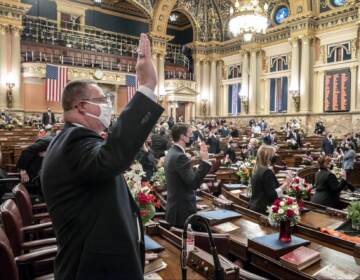Republicans say Pa. justice’s campaign rhetoric taints redistricting ruling
Lawyers for the state GOP filed an application Friday afternoon calling on the court to disqualify Justice David Wecht from the case.

Justice Christine Donahue and Justice David Wecht (right) during a campaign debate in Harrisburg in 2015 (AP Photo/Matt Slocum)
Republican lawmakers say the Pennsylvania Supreme Court’s decision to overturn the state’s congressional map should be vacated due to a Democratic justice’s stated bias against the way the districts were drawn in 2011.
Lawyers for the state GOP filed an application Friday afternoon calling on the court to disqualify Justice David Wecht from the case and invalidate his participation in critical proceedings during the past few months.
They say the order that expedited the redistricting lawsuit in the first place should be moot, along with the demand that parties produce census data and other information pertinent to the mapmaking process.
The lawyers also asked for additional disclosures from Justice Christine Donohue regarding her past statements about the 2011 congressional map.
The filing cited statements made by each justice – multiple in Wecht’s case – during their 2015 campaigns for the state’s top court.
Wecht repeatedly discussed his stance that “gerrymandering is an abomination.” He said that “Pennsylvania’s districts have been drawn to disenfranchise the majority of Pennsylvanians … by skilled political operatives and it needs to stop.”
At the time, his words concerned at least one newspaper editorial board as “veer[ing] near partisan territory in condemning what he called Pennsylvania’s ‘insane’ gerrymandering of legislative districts.”
Donohue pledged that “gerrymandering will end” to a crowd at an event sponsored by the League of Women Voters — the organization that later initiated the lawsuit. Some Democratic insiders also cited her campaign appearances as among the reasons they weren’t surprised the court ruled the way it did Jan. 22.
Neither justice responded to request for comment placed to their chambers and former campaign managers.
According to Friday’s GOP filing, Wecht’s words, in particular, signify at best a “firm and predetermined ideology” and, at worst, a “campaign promise.
In Pennsylvania, state law prohibits judges from making “pledges, promises, or commitments” about “cases, controversies or issues that are likely to come before the court” that would prevent them from impartially handling a related case.
State Supreme Court justices police themselves on conflicts of interest, disclosing them or recusing themselves from cases when appropriate.
And Donohue did, in this case, alert the court to getting campaign support from Democratic Lt. Gov. Mike Stack, who – along with other executive defendants in the case, including Gov. Tom Wolf – has advocated for overturning the map. Stack “lent his name” to a fundraiser for Donohue and his campaign kicked $1,000 her way, according to her disclosure filing from Jan. 11.
Donohue’s disclosure didn’t mention a $250 campaign donation from Stack’s lawyer Cliff Levine, but Republican defendants were aware of that, too, according to Drew Crompton, chief counsel to Senate Republicans
“We took a look at it,” said Crompton. “And we moved on,” he said, ultimately because they didn’t think it would prevent Donohue from being impartial.
GOP leaders could bring their complaint to the U.S. Supreme Court.
A high-profile recent example of this involved former Chief Justice Ronald D. Castille, who didn’t recuse from himself from appeals from a death row defendant who was prosecuted by Castille’s office when he was Philadelphia’s district attorney.
As a middle-ground option, the entire court has weighed in on other justices’ possible conflicts, according to Crompton, who couldn’t immediately give specific examples.
The defendants say they researched Wecht’s prior statements about gerrymandering after the court hearing in December. They say his line of questioning struck them as particularly pointed and strongly signaled potential bias, according to House Republicans spokesman Steve Miskin.
“We have an obligation to raise this,” Crompton said. “I know this is a partisan issue, it’s Republicans versus Democrats. But at some point, [the justices’] words matter.”
Ben Geffen, one of the lead attorneys representing the plaintiffs in the case, says this latest filing is a “desperate Hail Mary” on the part of legislative majority leaders.
“The perpetrators of this gerrymander have been finally called to account and they’re not happy about having their actions publicized nor are they happy about having a court of law take a good hard look at what they did,” Geffen said.
Republicans also are seeking a stay on the decision from the U.S. Supreme Court. The filing deadline for responses from Democratic voters and state officials was Friday.
Without federal intervention, the state court’s order compels the legislature and Gov. Tom Wolf to agree on a new map by February 15. If that deadline is not met, the court has pledged to draw its own map to be in place before the midterm election primaries in May.
The justices haven’t issued a full opinion in the case. So although they have said that Pennsylvania’s map “clearly, plainly and palpably” violates the state’s constitution, they haven’t yet detailed a standard to gauge when partisan influence makes a map illegal.
Editor’s note: This story was updated to clarify prior disclosures made by Justice Christine Donohue.
WHYY is your source for fact-based, in-depth journalism and information. As a nonprofit organization, we rely on financial support from readers like you. Please give today.







